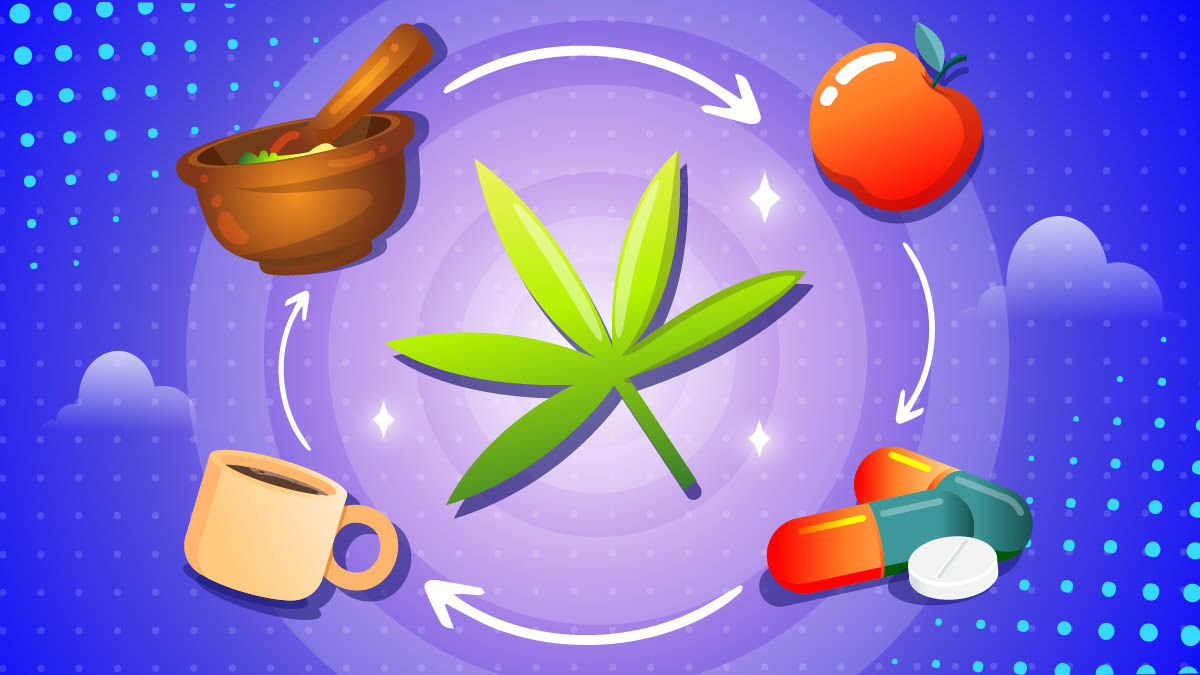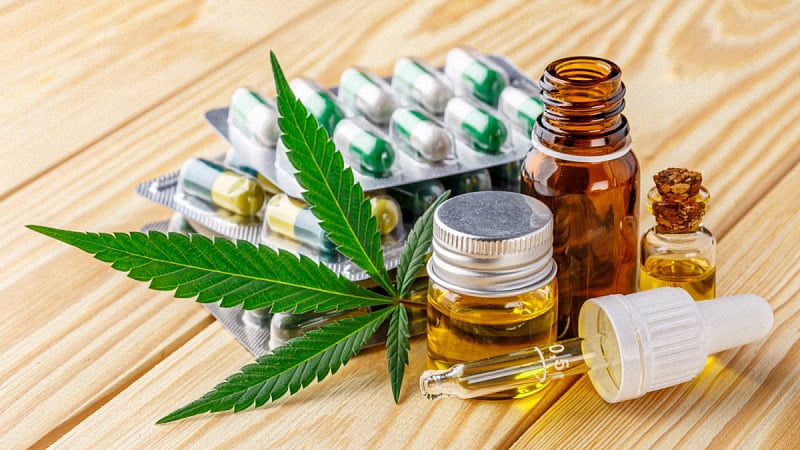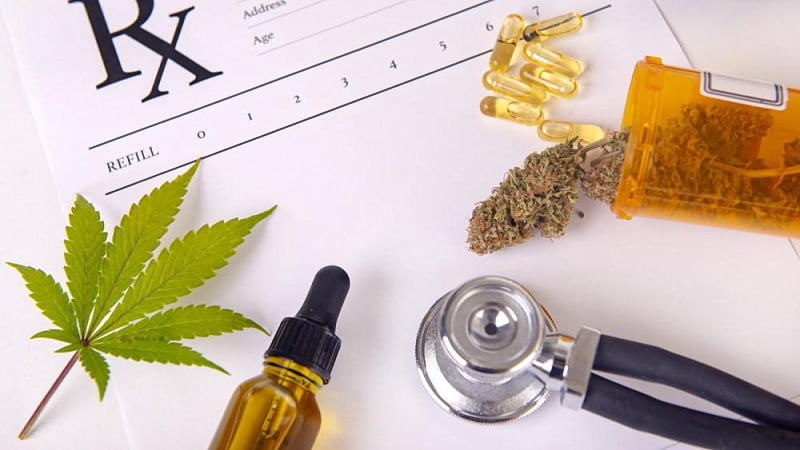CBD Drug Interactions – Mixing Cannabidiol and Medications

Are you worried about potential CBD-drug interactions? In this article, we explain the mechanism behind drug metabolism and how CBD may interfere with it.
The range of therapeutic properties offered by CBD (cannabidiol) has spurred its popularity in recent years. This natural compound is known to relieve a host of symptoms, allowing for safer and more effective management of different health conditions.
And unlike THC (tetrahydrocannabinol), CBD is non-intoxicating, so it won’t get you high.
CBD can assist in the treatment of anxiety disorders and depression, inflammation and pain, neurodegeneration, seizure disorders, sleep deprivation, metabolic conditions, neuropathy, migraines, inflammatory bowel disease, and more.
Considering CBD has so many potential health benefits, you may start wondering if it can interact with certain medications used to address the same symptoms — and whether you should or shouldn’t take these drugs with CBD.
Below you’ll find the dos and don’ts of using CBD along with medications.
Let’s start with the don’ts.
What Drugs Should Not Be Taken with CBD
Studies from the Indiana University Department of Medicine have provided a list of pharmaceutical drugs and medications which shouldn’t be taken with CBD.
The list below covers all groups of drugs that can negatively interact with CBD oil.
- Angiotension II Blockers
- Antiarrhythmics
- Antibiotics
- Antidepressants
- Anticonvulsants / Anti-Seizure Medications
- Antihistamines
- Antipsychotics
- Anesthetics
- Beta-Blockers
- Benzodiazepines
- Calcium Channel Blockers
- HIV Antivirals
- HMG CoA Reductase Inhibitors (Statins)
- Immune Modulators
- Non-Steroidal Anti-Inflammatory Drugs
- Oral Hypoglycemic Agents
- Proton-Pump Inhibitors (PPIs)
- Prokinetics
- Steroids and Corticosteroids
- Sulfonylureas
There’s also a group of drugs called “prodrugs” that first need to be processed into their therapeutic compounds instead of being therapeutic compounds on their own. In plain English, the inactive compound is consumed, and once in the body, it turns into the active compound.
If this mechanism is dependant on the CYP450 system (more on that later), a drug interaction can lead to insufficient concentrations of the therapeutic agent in the bloodstream — reducing its potency.
CBD Interaction with Drugs & Medications

This section covers the most common interactions between CBD and medications. If you take any of the substances listed below, make sure to consult your doctor before buying CBD oil.
CBD and Ibuprofen Interaction
Ibuprofen is one of the Non-Steroidal Anti-Inflammatory Drugs (NSAIDs), meaning it can produce similar benefits to CBD in terms of inflammation and pain relief. Previously we’ve mentioned that NSAIDs interact with CBD, which may raise concerns about potential negative interactions between CBD oil and Ibuprofen.
According to a study from the Journal of Neurology Research, there have been no reported interactions between CBD and ibuprofen, although it doesn’t mean they do not exist. Health experts suggest that potential interactions may be dosage-dependent. If a certain dosage threshold is breached, CBD and NSAIDs like Ibuprofen can lead to unforeseen and potentially severe nervous system pathology.
CBD and Adderall Interaction
A 2020 study found that higher doses of medical cannabis led to a decreased use of ADHD medication in adults. Products containing a higher concentration of CBD were linked to lower ADHD scores. This means that CBD can interact with ADHD meds, decreasing their efficacy while providing more pronounced benefits. The potential side effects of interactions between CBD and Adderall may lead to decreased appetite.
CBD and Lamictal Interaction
Using medical cannabis and Lamictal may increase side effects such as dizziness, confusion, drowsiness, and difficulty concentrating. Elderly consumers may also experience impairment in judgment. That being said, none of these side effects were proven to result from CBD use per se. When it comes to interactions between CBD and Lamictal, it can make the medication more or less effective, depending on the dosage.
CBD Oil and Antibiotics
There is no known interaction between CBD and antibiotics, although these interactions may occur if an antibiotic is metabolized through the cytochrome P450 enzyme system. Some studies indicate that taking CBD and antibiotics together may amplify the effects of one another without any negative side effects. However, more research is needed to confirm these findings on a larger scale.
CBD Oil and Omeprazole
CBD can inhibit the enzymes that are targeted by omeprazole and other Proton Pump Inhibitors (PPIs). Taking CBD with certain heartburn medications can increase the risk of diarrhea.
CBD and Thyroid Medications
Some people report mild nausea when taking CBD oil together with their thyroid medications. Since both substances are processed by the CYP450 enzyme system, taking CBD with a thyroid medication may cause hyperthyroidism because more thyroxine would be secreted than the body could metabolize.
CBD and Lisinopril
CBD can temporarily lower blood pressure, so taking it alongside medications like Lisinopril might reduce it even more, making you feel lethargic and weak. Always consult your doctor before adding CBD to your routine if you use anti-hypertension meds.
CBD and Prednisone
Since both CBD and corticosteroids are potent inhibitors of the CYP450 enzyme system, concomitant use may increase the risk of systemic side effects from corticosteroid use due to decreased glucocorticoid clearance. Corticosteroids like prednisolone and hydrocortisone should never be taken with CBD.
How Drugs Interact: Understanding Drug Metabolism
Metabolism can refer to how your body uses energy for weight management, or the way drugs are metabolized in your body.
The former is known as the basal metabolic rate, or in simple terms, the number of calories a person needs to maintain healthy body functions while at rest.
The latter is very different from the basal metabolic rate. Drug metabolism refers to how a substance is processed and used by the body — with the majority of this processing happening in the liver.
Scientists call it the ‘first-pass effect’ or ‘first-pass metabolism.’
Using straightforward terms, when you take a medication, it is broken down in the liver into its active compounds so that the body can use them. Just like carbohydrates are broken down into sugars, fats into triglycerides, and proteins into amino acids — drugs break down into their individual ingredients.
From there, they are controlled by specific enzymes, which transform these compounds into metabolites. These metabolites then influence different processes in your body and are flushed with urine once used up.
How Is CBD Metabolized?

Drug metabolism determines the rate at which the body processes medications and other therapeutic compounds into their individual metabolites and how long they can stay in your system.
When you take CBD in the form of an oil, capsule, or gummy, it has to pass through your gut, where it is released into the bloodstream. From then, they travel through the bloodstream to the liver, where it absorbs through the hepatic portal. The liver breaks CBD down into its metabolites using enzymes, after which it can circulate throughout the body in the bloodstream again.
What Is the Cytochrome P450 System?
Aside from breaking compounds down into metabolites, the liver also detoxifies and excretes foreign substances and other types of toxic compounds. This can happen through a system of enzymes referred to as the Cytochrome P450 (CYP450). These enzymes contain heme as a cofactor to convert cannabinoids into more water-soluble molecules, increasing their absorption and efficacy.
Researchers estimate that the CYP450 system is responsible for metabolizing 60% of any drugs out there. And interestingly, doctors and pharmacists use this system to understand, evaluate, and predict the benefits of the drug and potential side effects based on their dosages.
However, certain compounds have the ability to compromise the CYP system’s functioning, negatively affecting the metabolism of certain medications. Once these interactions occur, the drugs can be metabolized faster or slower than normal.
CBD And the Cytochrome P450 System
As mentioned earlier, CBD can interact directly with the CYP450 system in the liver. According to preclinical studies, CBD binds to the site where the enzyme activity occurs, competing with other compounds and thus preventing this system from breaking down other substances.
This inhibitory effect on the CYP450 enzymes mainly depends on how much CBD a person takes, their unique physiology, and the type of CBD used (e.g., full-spectrum CBD vs. CBD isolate). The dosage determines the strength used by the CBD to bind to the active site of the metabolic enzymes. The tighter the bond, the more competitive inhibition.
Contraindications for Taking CBD with Medications
The mechanism behind CBD’s health benefits proves that it’s not a biologically inert compound. Instead, the pharmacokinetics and pharmacodynamics of CBD are complex and similar to any other medication. Therefore, it has the potential to compromise the metabolism of certain medications.
Any therapeutic substance that relies on the CYP450 system can be potentially affected by CBD. A common indicator for such interaction is when your medication has a grapefruit warning on the bottle. However, this is by no means a solid point of reference, and you should always check with your doctor and pharmacist before taking the two compounds together.
Why You Should Always Consult Your Doctor First
The list of drugs that we’ve mentioned above is by no means definite and doesn’t include all the pharmaceutical substances that may interact with CBD. Similarly, not all the medication from these categories will necessarily cause an interaction — as is the case for antibiotics and Ibuprofen.
A consultation with a doctor experienced in CBD and cannabis use can help you establish the right routine for your medications and supplements to avoid potentially negative interactions. Some compounds work synergistically with CBD, so asking your doctor can help you maximize the effect of your treatment.
Not to mention that the doctor can guide you on finding the optimal dosage for yourself.
Key Takeaways on CBD Drug Interactions
The safety profile of CBD has been acknowledged by major health agencies, such as the World Health Organization (WHO), showing that it’s well-tolerated by animals and humans and rarely produces any dangerous side effects.
CBD also has a profound impact on an array of systems, which explains its therapeutic versatility. That being said, this versatility is also the reason why CBD interacts with so many prescription meds and over-the-counter (OTC) PRODUCTS.
Again, if you’re not sure if CBD will interact with the medication that you might be taking, a consultation with a health professional will not harm — unlike trying to figure out these interactions on your own.